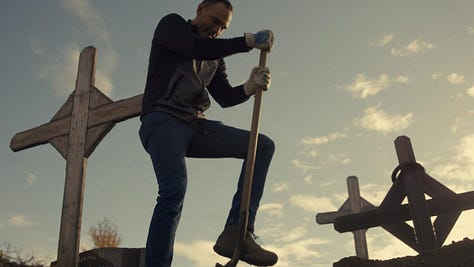Something to watch tonight: Friday 20 December
Three new streaming documentaries: Sugarcane is on Disney+, The Bibi Files is on DocPlay and Faye is on Neon
Editor’s note
In case you missed it earlier in the week, confirming that this will be the last newsletter for 2024. I’m taking a break for a couple of weeks (and throwing myself into six weeks of At the Summer Movies for RNZ) and the first edition of 2025 should land at 3.15 NZDT on the afternoon of 6 January.



We sat in stunned silence for a few minutes after the final credits rolled past at the end of Sugarcane. What can you say?
The film is named after the Sugarcane Reserve, the unofficial name for the Williams Lake Indian Reserve in British Columbia, Canada, location of the St. Joseph’s Residential School, one of hundreds of schools set up in the late 19th and early 20th century to teach the children of Native people how to be proper Canadians. Or Americans, there were plenty of these institutions in the US, too.
The film follows tribal investigators, the young Williams Lake Chief Willie Sellars, former Chief Rick Gilbert, filmmaker Julian Brave NoiseCat and his father Ed, as they try and find out the truth about the systematic abuse (and worse) of children supposedly cared for by the Catholic Church at St. Joseph’s.
I say “and worse” because our usual definitions of abuse barely covers what went on there. Apart from the freezing or drowning deaths of runaways, the suicides of former residents in appalling numbers, the denial of indigenous culture and belief, the contemptible dehumanisation of the whole thing – that’s just the beginning.
Children were removed from their homes and families at the age of five and taken to these schools where many would be physically and sexually abused, Often girls would be made pregnant by Brothers, their children adopted back into Native families so that they could be taken away to repeat the cycle. They were, you might say, the lucky ones. Countless newborn babies were simply placed in the school incinerator, never to be spoken of.
Astonishingly, many of these victims have kept their Catholic faith. Gilbert joins a group that travels to Rome for an audience with Pope Francis, an abused person’s hope that they may yet bask in the love of their abuser. He has a meeting with the current head of the order that ran St. Joseph’s who, while clearly moved and troubled by what had been done in his name, tries to tell us that ‘we had a bad 100 years or so there, but we are trying to do better’.
The conclusion I came to is that the Catholic Church has given up any right to a social license and should simply be dissolved and all its riches shared among its adherents – the poorest first.
Equally heartbreaking is that the burden of healing the multiple generations affected falls on their own community. “We don’t normally do this,” says the Royal Canadian Mounted Police officer as he opens up file after file of unsolved – often uninvestigated – heinous crimes so that the tribal investigators can start putting the pieces together, decades later.
There were hundreds of victims at St. Joseph’s and St. Joseph’s was one of hundreds of schools that operated in the same way. It simply defies comprehension.
Another troubling realisation in a week of them was seeing the case made that the deaths of tens of thousands of people in Gaza, the West Bank, Lebanon, and now Syria, can be traced back to one man’s taste for expensive cigars (and his wife’s preference for the finest champagne).


